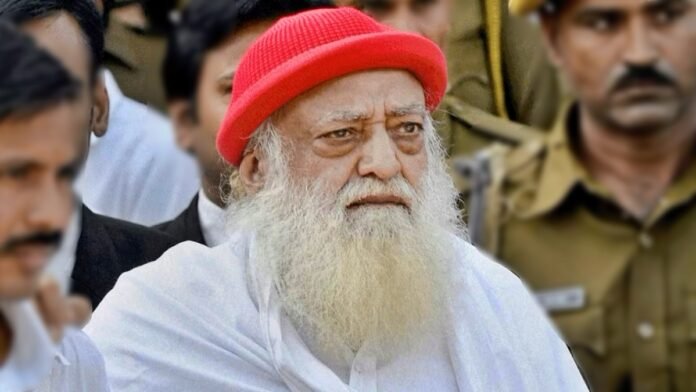
Key Points
- Rajasthan High Court granted 6 months interim bail to self-styled godman Asaram Bapu on medical grounds on October 28, 2025
- Decision was taken by Acting Chief Justice Sanjeev Prakash Sharma and Justice Sangeeta Sharma’s division bench
- Asaram, 84, is serving life imprisonment for raping a 16-year-old girl at his Jodhpur ashram in August 2013
- He had surrendered to Jodhpur Central Jail on August 29, 2025, after HC refused to extend his previous interim bail
- This is Asaram’s second interim bail in 2025; Supreme Court first granted him bail in January for medical treatment
- Senior Supreme Court advocate Devdutta Kamat argued for Asaram citing deteriorating health and advanced age
- Asaram is currently undergoing treatment at a private hospital in Jodhpur
- He was arrested in August 2013 and has been in custody for over 12 years, convicted in April 2018
- His son Narayan Sai is also serving life imprisonment in a separate rape case from Surat, Gujarat
Jodhpur: The Rajasthan High Court on Wednesday, October 28, 2025, granted six months of interim bail to self-styled godman Asaram Bapu on medical grounds, providing him another opportunity to seek treatment outside jail after his surrender just two months ago. The decision was pronounced by a division bench comprising Acting Chief Justice Sanjeev Prakash Sharma and Justice Sangeeta Sharma following a hearing on Asaram’s regular bail petition filed on health grounds.
Asaram, now 84 years old, had filed a regular bail plea citing his deteriorating health and the urgent need for specialized medical treatment that he claims cannot be adequately provided within the prison healthcare system. His legal team argued that his advanced age and multiple ailments necessitate continuous medical monitoring and care at private healthcare facilities.
Senior Supreme Court advocate Devdutta Kamat represented Asaram during the hearing, presenting detailed medical reports and arguments about the self-styled godman’s health conditions. Advocate Deepak Chaudhary argued the state government’s position, while advocate PC Solanki represented the victim’s interests.
After hearing arguments from all parties, the bench accepted the bail application, granting interim relief for a period of six months. At present, Asaram is undergoing treatment at a private hospital in Jodhpur, where he has been receiving medical care for various age-related ailments.
Background: Conviction and Life Imprisonment
Asaram Bapu has been serving a life sentence for raping a 16-year-old schoolgirl at his ashram in Jodhpur in August 2013. The minor victim’s parents were both devotees of the self-styled spiritual leader, and the crime occurred when they had brought their daughter to the ashram seeking his blessings.
The case came to light when the traumatized teenager complained to Jodhpur police in August 2013, leading to Asaram’s arrest later that month. The arrest of the high-profile spiritual figure, who commanded millions of followers across India and abroad, created nationwide controversy and sparked violent protests by his supporters in several cities.
Just two months after the Jodhpur case, in October 2013, Asaram and his son Narayan Sai were booked for allegedly raping two sisters at their ashram in Surat, Gujarat, in another shocking revelation of sexual exploitation within the organization. Narayan Sai was subsequently convicted in 2019 for offences including rape and unnatural sex and is currently serving his sentence in Gujarat.
Asaram was convicted in April 2018 by a Jodhpur court and sentenced to life imprisonment, marking the end of a high-profile trial that lasted nearly five years. He has been incarcerated in Jodhpur Central Jail since his arrest in August 2013, spending over 12 years in custody.
Previous Bail History in 2025
This October 28 order represents Asaram’s second interim bail in 2025, following a complex legal journey involving multiple courts over the past year. In January 2025, the Supreme Court granted him interim bail until March 31, 2025, marking the first time he was released from custody in his 12 years of imprisonment.
The Supreme Court’s bail order came solely on humanitarian grounds for medical treatment due to his deteriorating health conditions. A bench of Justices MM Sundresh and Rajesh Bindal imposed strict conditions, directing that Asaram shall not attempt to tamper with evidence and shall not meet his followers after being released on interim bail.
Following the Supreme Court’s initial grant of bail, the Gujarat High Court extended his interim bail on March 28, 2025, for three months on medical grounds, recognizing his need for specialized care and continuous monitoring for various ailments. This extension was later further prolonged by the Gujarat High Court on July 3, 2025, for one month until August 12, 2025.
The Rajasthan High Court had also extended his temporary bail on multiple occasions during this period. In July 2025, a division bench of Justices Dinesh Mehta and Vinit Kumar Mathur extended his temporary bail until August 12, 2025, while clarifying that no further extension would be granted.
August Surrender After Bail Refusal
The turning point came in late August 2025 when the Rajasthan High Court refused to extend Asaram’s interim bail any further, forcing him to return to custody. On August 27, 2025, a high court bench of Justices Dinesh Mehta and Vineet Kumar Mathur dismissed Asaram’s bail extension plea during a crucial hearing.
The court’s decision was based primarily on a medical board report from the Government Hospital, Ahmedabad, which stated that Asaram’s health condition was stable and he did not require hospitalization or continuous medical care. This assessment contradicted the claims made by Asaram’s legal team about his critical health status.
During the August 27 hearing, Asaram’s lawyer Nishant Bodha argued that Asaram had been taken to AIIMS Jodhpur on August 21, 2025, where doctors reported a deterioration in his health condition. However, the High Court did not accept this argument and, relying on the medical board’s report from Ahmedabad, dismissed the bail plea.
The court also made critical observations about Asaram’s medical treatment pattern, noting that he had made several trips for treatment at different hospitals in various cities over the preceding 3-4 months but did not undergo regular follow-ups at any hospital. This observation suggested a lack of genuine commitment to continuous medical care at any single facility.
With no further legal recourse immediately available, Asaram surrendered at Jodhpur Central Jail on August 29, 2025—just two days after the court refused to extend his bail. This surrender came after approximately eight months of freedom that he had enjoyed following the Supreme Court’s initial bail grant in January.
Fresh Bail Application and Legal Arguments
Following his surrender in August, Asaram’s legal team filed a fresh regular bail application before the Rajasthan High Court, once again emphasizing medical grounds and the need for specialized treatment. This new application represented a different legal strategy, seeking regular bail rather than mere extensions of temporary or interim bail.
The acting Chief Justice Sanjeev Prakash Sharma’s division bench took up the matter for hearing on October 28, 2025. The composition of the bench differed from the one that had rejected his bail extension in August, potentially offering Asaram’s legal team hope for a more favorable outcome.
Senior Supreme Court advocate Devdutta Kamat, known for handling high-profile cases, was brought in to argue Asaram’s case, representing a step-up in legal representation compared to previous hearings. Kamat’s arguments focused on Asaram’s advanced age of 84 years, deteriorating health conditions, and the fundamental right to adequate medical care even for convicted prisoners.
The legal team presented updated medical documentation supporting claims that Asaram suffers from multiple age-related ailments requiring continuous monitoring and specialized treatment. They argued that the prison healthcare system, despite best efforts, cannot provide the level of medical intervention required for someone of his age and health status.
State government advocate Deepak Chaudhary presented the prosecution’s position, likely emphasizing the severity of Asaram’s crimes, the possibility of witness intimidation or evidence tampering, and questioning whether his medical condition genuinely warrants release from custody. The state’s position would have also referenced the August medical board report that found his condition stable.
Advocate PC Solanki, representing the victim’s interests, would have argued against granting bail, emphasizing the trauma suffered by the survivor and the need for justice to be served without undue leniency toward the convict.
Court’s Decision and Conditions
After considering the arguments from all parties and reviewing the medical documentation, the division bench decided to grant six months of interim bail to Asaram on medical grounds. The decision reflects a balancing act between the convict’s right to adequate healthcare and the need to ensure that justice is served for the heinous crime he was convicted of committing.
While the detailed order with specific conditions has not yet been made public as of October 28 afternoon, precedent from the Supreme Court’s January bail order suggests that the Rajasthan High Court likely imposed strict conditions on Asaram’s release. These conditions typically include:
- Prohibition on meeting followers or disciples to prevent any gathering that could be construed as a public appearance or religious function
- Restrictions on tampering with evidence or influencing witnesses, though at this stage most evidence is already on record
- Regular reporting requirements to designated authorities
- Limitations on travel outside specified jurisdictions without court permission
- Requirement to appear for all court hearings and cooperate with any ongoing legal proceedings
- Prohibition on making public statements about the case or the victims
The six-month duration of the interim bail provides a defined timeframe for Asaram to seek medical treatment while ensuring that the court maintains oversight over his custody status. The time-bound nature also allows authorities to reassess his medical condition after this period before deciding on any further extensions.
Current Medical Treatment
According to reports, Asaram is currently receiving treatment at a private hospital in Jodhpur, where he has been undergoing medical care even during his recent incarceration period. The nature and specifics of his medical conditions have not been publicly disclosed in detail, though his legal team has consistently cited multiple age-related ailments requiring specialized intervention.
The fact that he is already under treatment at a private facility suggests that the court’s bail order may allow him to continue receiving care at the same institution or similar private healthcare facilities rather than being restricted to government hospitals. This arrangement addresses the core argument that prison healthcare infrastructure cannot adequately meet his medical needs.
Controversial History and Public Reactions
Asaram Bapu’s case has remained one of the most controversial in India’s recent legal history, involving a high-profile spiritual figure with millions of followers who was convicted of sexually exploiting minors who trusted him as a religious guide. His arrest and conviction shattered the image of the benevolent guru he had cultivated over decades.
The repeated grants of bail on medical grounds have generated significant public debate and criticism from women’s rights activists, legal experts, and victims’ advocacy groups who argue that powerful and influential convicts receive preferential treatment compared to ordinary prisoners. Critics point out that many elderly prisoners with serious medical conditions remain incarcerated without similar considerations.
Supporters of Asaram, who continue to believe in his innocence despite the conviction, have welcomed each bail order as vindication and have consistently maintained that the charges were fabricated as part of a conspiracy. However, the courts have consistently upheld the conviction based on the evidence and testimony presented during the trial.
The victim’s family and their legal representatives have expressed concern each time bail has been granted, fearing that Asaram’s release, even if temporary and conditiona,l might embolden his followers and potentially intimidate witnesses or the victim’s family. Their participation through legal counsel in bail hearings reflects these ongoing concerns.
Legal Precedent and Medical Bail Jurisprudence
The granting of bail to Asaram reflects broader legal principles regarding medical bail for elderly convicts that Indian courts have been developing through various judgments. The judiciary has increasingly recognized that denying adequate medical care to prisoners, regardless of their crimes, violates fundamental rights under Article 21 of the Constitution.
However, courts must balance this humanitarian consideration against several other factors:
- The severity of the crime committed in this case, rape of a minor, which is among the most serious offences
- The life sentence imposed, indicating the gravity with which the trial court viewed the crime
- Risk of the convict influencing witnesses or tampering with evidence, though this risk diminishes over time as the trial concludes
- Public interest in seeing justice served without creating a perception that influential convicts receive special treatment
- The convict’s age and genuine medical needs versus the possibility of exaggerating health issues to secure release
The Supreme Court’s January 2025 bail order set an important precedent in Asaram’s case, establishing that even high-profile convicts serving life sentences can receive interim bail for genuine medical reasons when supported by credible medical evidence. The Rajasthan High Court’s October decision follows this precedent while exercising its own judicial discretion.
Implications and Future Proceedings
With this six-month interim bail, Asaram will be able to seek treatment outside prison until approximately April 2026. The court will likely review his medical status and the appropriateness of continued bail as this period approaches its end.
His life sentence remains in effect, and the bail does not impact his conviction or the ongoing punishment. He remains a convict serving a sentence, merely granted temporary relief for medical treatment under strict conditions.
The case also raises questions about whether Asaram will file appeals against his conviction in higher courts, though no information about pending appeals is mentioned in current reports. His legal strategy may involve both seeking medical relief through bail applications and potentially challenging the conviction itself through the appellate process.
Meanwhile, his son Narayan Sai continues serving his sentence in Gujarat for the separate rape case from Surat. Narayan Sai was granted five days of temporary bail by the Gujarat High Court in June 2025 to meet his ailing father, Asaram, as the two had not met since Narayan Sai’s incarceration in 2013.
The detailed written order from the Rajasthan High Court’s October 28 hearing is expected to be released soon, which will provide complete clarity on the specific conditions imposed on Asaram’s interim bail and the court’s reasoning for granting this relief.











































